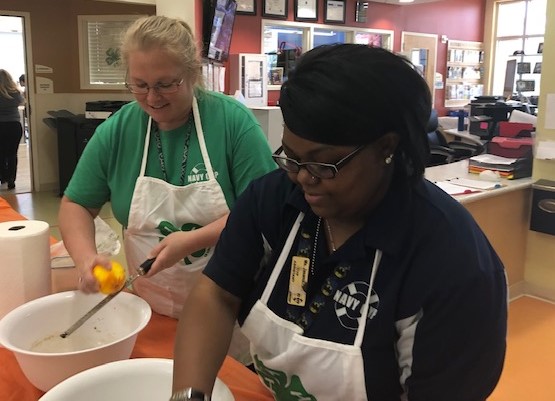
by pmdavis | Feb 14, 2019
Making lotions and bath scrubs, practicing relaxation and doing yoga…doesn’t this sound like a great 4-H club program? Discover 4-H Spa and Relaxation Clubs are a great way to learn about homemade body products while learning relaxation techniques. Youth create a day at the spa by making lotions, soaps, scrubs and lip balms while learning methods to relax like tennis ball massages, creating a happy list, doing yoga and creating a zen garden. An added bonus is homemade products are a fraction of the cost of purchasing and make great gifts for friends and family.
Make your own Luxurious Bath Salts
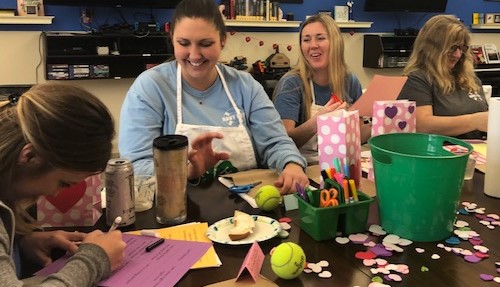
Naval Support Activity-Panama City staff learning how to making calm bags.
- ½ cup baking soda
- ½ cup powdered milk
- 1 cup sea salt
- 1 cup Epsom salt ( scented or plain)
- Use 3-5 drops fragrance oil designed for soaps or diluted essential oil for plain Epsom salt
- Mix ingredients
- Spoon the mixture into storage containers (wide mouth jars, bowls or zip style bags work well)
- Label your container with ingredients and direction for use – Pinterest has several cute label designs
Caution: Essential oils are very strong and can be a skin irritant if applied directly to your skin. National Association for Holistic Aromatherapy recommends diluting essential oils with a carrier oil: use 1 teaspoon of coconut, almond, olive, sunflower or jojoba oil with 2 – 12 drops of the desired essential oil. Then, mix 3-5 drops of the diluted oil to your bath salt mixture. Bath salts are generally safe for most when used properly, but you should talk to your doctor before using bath salts if you have medical conditions such as skin diseases, heart disease or diabetes.
How to Use Your Bath Salts: Fill your tub halfway with warm to hot water, and pour in about 1/2 cup (120 g) of bath salts. For a stronger concentration, you can always add more. If you prefer showers, take a handful and rub over desired area. Bath salts are great to exfoliate by removing dead skin cells leaving the skin smooth and fresh. Tired achy feet or hands? No problem! Add salts to warm water in a dishpan, and immerse your feet or hands and soak away the pain.

NSA-PC staff learning the 4-H Spa & Relaxation Curricula they will use in their 4-H programs.
For more information on 4-H and other programs like this, contact your local UF/IFAS County Extension Office, or visit Florida 4-H.
Are you an adult looking for ways to coach, teach and mentor youth? Contact the 4-H Agent in your county and enroll as a volunteer in 4-H Online. Volunteering not only strengthens the 4-H club, but also shows young people how to live with integrity, optimism, hope, determination, compassion, responsibility and resiliency – skills that will help them succeed in life.
Resource:
Discover 4-H Spa and Relaxation Clubs curriculum
by pmdavis | Jun 29, 2018
Summer time is a great time to teach youth about solar energy!
Use s’mores to teach your kids about two different types of energy: kinetic and radiation. Kinetic energy is energy in motion. Radiation is energy made through electromagnetic waves. Heat and light waves penetrate food without direct contact between the heat source and the food. Solar ovens, toaster ovens and microwaves are all methods of radiation cooking.
To make the solar oven like you see below, get a pizza box and follow these steps:
- Line the inside of the box with foil.
- Make an opening on the top of the box by cutting three sides leaving the other side attached so it flaps open.
- Cover the opening with clear plastic wrap.
- Assemble your s’more (see tips below).
- Close the lid of the box and raise the foil covered flap.
- Make sure the sun is reflecting onto the oven opening.

Remember to orient your box according the time and sun location. For example, if it’s late afternoon and the sun is on your right, you must be facing south. You would want to turn your oven so the reflective waves would be heating up your oven in more of a westerly direction.
Hints and Tips
- Place the graham cracker and marshmallow in the oven first.
- Add the chocolate once the marshmallow is partially cooked. (Otherwise, the chocolate will be liquid by the time the marshmallow is melted).
- Speed up the process by preheating your oven.
- Give yourself time and other activities to keep the group entertained. It took the group pictured above about an hour to have the tasty treat!
Want more science tips and ideas?
Check out these sites to discover more fun science: http://edis.ifas.ufl.edu/ , http://florida4h.org or http://utah4h.org/discover/.
For more information about how 4-H incorporates science into learning, contact your local extension office.
by pmdavis | Oct 4, 2017
As part of National 4-H W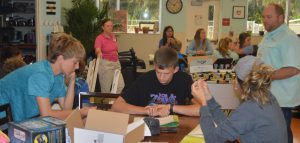 eek, 4-H’ers participate in 4 H National Youth Science Day (NYSD), the world’s largest youth-led science experiment. This year’s 4 H NYSD event will take place on October 4. The 2017 4‑H National Youth Science Day Challenge is called Incredible Wearables! This year’s challenge was developed by University of Nebraska-Lincoln and incorporates the fast-evolving field of wearable technology, teaching kids to not only use technology but to create it and understand how it works.
eek, 4-H’ers participate in 4 H National Youth Science Day (NYSD), the world’s largest youth-led science experiment. This year’s 4 H NYSD event will take place on October 4. The 2017 4‑H National Youth Science Day Challenge is called Incredible Wearables! This year’s challenge was developed by University of Nebraska-Lincoln and incorporates the fast-evolving field of wearable technology, teaching kids to not only use technology but to create it and understand how it works.
From watches and eyewear to fashion and virtual reality headsets, wearable technologies are fast becoming the must-have accessory for forward-thinking people around the world. Wearable technologies didn’t start out as trendy however – one of the world’s first wearable technologies was the hearing aid! Wearable technologies are now used in industries around the globe, from education and sports, to health, fashion, entertainment, transportation and communication. In this year’s challenge, youth use the engineering design process to build a prototype wearable technology that will gather data to help solve a real-world problem. They will design and build their own low-cost wearable health monitor following the engineering design process. This process includes defining the problem, designing and building prototypes (solutions) then systematically testing and evaluating enabling them to redesign for optimization of wearability and functionality.
During the innovative, hands-on project, these future engineers must work together to design, build and refine a wearable health-tracking device that is easy-to-use and aesthetically appealing. In fact, youth from Bay County have been training with their adult leaders to teach this challenge to other youth in their community on National Youth Science Day. Jason Scott, from Scott Innovative Solutions and an engineer at NSA PC, teamed up with the Bay County 4-H Agent to teach youth and adult partner teams about this project enabling them to be able to share their knowledge with others on October 4. When participants will attempt to solve the problem of people not staying active enough to lead healthy lives. In fact, youth will build a prototype fitness tracking device that could ultimately be marketed and sold to consumers to positively affect fitness behaviors.
After completing the challenge youth will have had an experience of using the engineering design process to build a device to help them monitor their health so they can gather data to make better decisions. They will understand more about how wearable technologies like FitBits, Smartwatches and other wearable devices are made.
The field of wearable technologies continues to grow in both quantity and quality. New technologies are being developed and put on the market on a regular basis, including virtual reality and augmented reality devices, clothing and accessories, as well as health monitoring devices. The future of wearable technologies is limited only by the imaginations of those designing them. By studying STEM and participating in this National Youth Science Day Experiment, youth could use technologies to develop products and mechanisms we haven’t even thought of, but definitely desire! To find out more information about other 4-H programs like this or volunteer your time to work with youth, contact your local UF IFAS County Extension Office or visit http://florida4h.org.
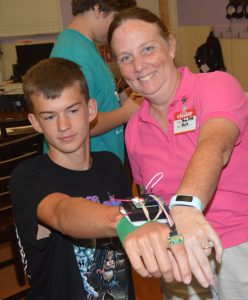
Comparing device to prototype
by pmdavis | Oct 2, 2017
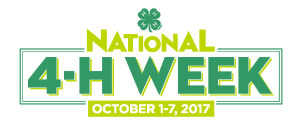 October is an exciting month for 4-H – we have some great things happening. First, it includes National 4 H Week, October 1-7. This year during National 4-H Week, The Northwest district is proud to celebrate the #TrueLeaders that make our community great. Every child deserves to be recognized for the great things they are doing. Help us celebrate #TrueLeaders during National 4-H Week by shouting out your favorite 4-H’er. #TrueLeaders lead by example, empowering their peers and inspiring communities. 4-H’ers, show your pride this National 4-H Week! Share photos of how youth are stepping up as #TrueLeaders in your county.
October is an exciting month for 4-H – we have some great things happening. First, it includes National 4 H Week, October 1-7. This year during National 4-H Week, The Northwest district is proud to celebrate the #TrueLeaders that make our community great. Every child deserves to be recognized for the great things they are doing. Help us celebrate #TrueLeaders during National 4-H Week by shouting out your favorite 4-H’er. #TrueLeaders lead by example, empowering their peers and inspiring communities. 4-H’ers, show your pride this National 4-H Week! Share photos of how youth are stepping up as #TrueLeaders in your county.
As part of National 4-H Week, 4-H’ers participate in 4 H National Youth Science Day (NYSD), the world’s largest youth-led science experiment. This year’s 4 H NYSD event will take place on October 4.
Our local Tractor Supply Company will be supporting 4-H clubs October 4-15 with their Paper Clover Campaign, this is a national in-store fundraiser that benefits state and local 4-H programs. Tractor Supply invites friends and family to support 4-H by donating $1 at store checkouts for scholarships that send local kids to 4-H camp and other 4-H leadership experiences.
October also represent a time when our local tailgating youth will advance to the state finals. The northwest district will have 8 youth advancing to the state competition October 14.
October also means that it is fair time! You will be able to view our 2017 4-H youth exhibits across the Panhandle at local fairs and rodeos!
Central Panhandle Fair – October 2 -7
Art in the Garden Festival at the UF IFAS Research Center in Quincy- October 7th
Bonifay Rodeo – October 5-7
Walton County Fair – October 9-14
Panhandle Youth Expo– October 11th-14th
Pensacola Interstate Fair – October 19-24
North Florida Fair – November 2-12
Local 4-H youth will exhibit their artwork, plants and animals that they have been caring for this past year. Youth exhibits and plants are judged. Youth receive ribbon awards using the Danish judging system at county and regional fairs. This means that exhibits are judged against a “standard” rather than against other exhibits. For example, a painting that has been created by a 4-H’er is not compared to other paintings. Rather, it is judged according to the criteria of standards for paintings. A blue ribbon means that the exhibit meets high standards and good quality work is shown.
October and November are busy months in 4-H. To find out more information about other 4-H programs like this or volunteer your time to work with youth, contact your local UF IFAS County Extension Office or visit http://florida4h.org.
by pmdavis | Apr 6, 2017
 April is the Month of The Military Child! When we think of honoring our military, we often think of Memorial Day and Veterans Day. Did you know there is also a time identified to honor our youngest heroes, military children? Since 1986, April has been designated Month of the Military Child. This allows us to honor military children and their families for their commitment and sacrifice. In Florida, we have over 94K active and reserve military members whose families worry that they are in harm’s way when they deploy. Most people think of the color green when they think of 4-H, but on April 21st, 4-H youth and volunteers in Florida and Nationally will be sporting the color purple to show support for our military families.
April is the Month of The Military Child! When we think of honoring our military, we often think of Memorial Day and Veterans Day. Did you know there is also a time identified to honor our youngest heroes, military children? Since 1986, April has been designated Month of the Military Child. This allows us to honor military children and their families for their commitment and sacrifice. In Florida, we have over 94K active and reserve military members whose families worry that they are in harm’s way when they deploy. Most people think of the color green when they think of 4-H, but on April 21st, 4-H youth and volunteers in Florida and Nationally will be sporting the color purple to show support for our military families.
Here locally we want you to join us in showing your support and to celebrate our young heroes! Participate in the 7th annual Purple Up! For Military Kids. Wear purple on Friday, April 21st, as a visible way to show support and thank military children for their strength and sacrifices. Why purple? Purple is the color that symbolizes all branches of the military, as it is the combination of Army green, Coast Guard blue, Air Force blue, Marine red and Navy blue.
The goal is for our military youth to see the support of their community. Please join us in honoring these young heroes as we Purple Up! For Military Kids on April 21st! Be creative….the goal is for military youth to see the support in their school, youth groups, and the community! If you don’t have or own a purple shirt wear a purple ribbon, tie, headband etc. Just show your support and let our youth know we care about them! Can’t make the 21st ? Then do something another day in April. We would like to encourage you to take pictures of your group wearing purple and share them on social media using #fl4h, #purpleup.







